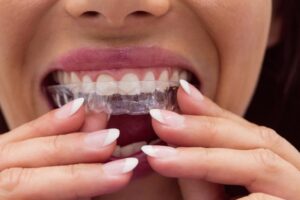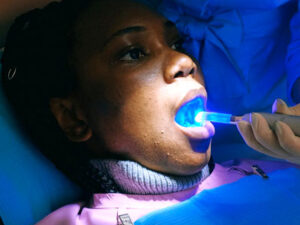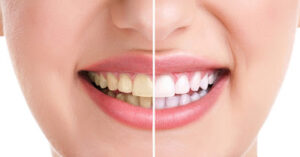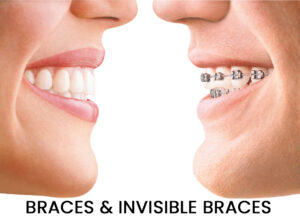Fixed Teeth and Bridges

Fixed Teeth or Bridges
Replacement of missing teeth represents the largest category among patients in clinics who are looking for better esthetic and functional teeth. The fixed partial denture (FPD) is one of the most commonly preferred definitive treatment options for a single missing tooth
For many years, FPDs were considered to be the best treatment choice for replacing a single missing tooth. Fixed prosthodontics treatment can range from the restoration of a single tooth to rehabilitation. Single teeth can be restored to full function, and improvement in cosmetic effect can be achieved. Missing teeth can be replaced with prostheses that will improve patient comfort and masticatory efficiency, maintain the health and integrity of the dental arches. Every restoration must not be able to withstand the occlusal forces to which it is subjected. The replacement of the missing teeth in the posterior region is equally important as in the anterior segment of the mouth. The maximum number of posterior teeth that allow replacing with an FPD is usually two. In rare circumstances, three can be replaced, but that should be attempted only under ideal conditions
What Are Dental Crowns?
Dental Crowns are a tooth cap that is placed on the tooth to restore the shape, size, and appearance of the tooth. It also improves the strength of the tooth. If a major part of the tooth is missing, then the crown is the best solution for it. Crown can help the functioning of a tooth normally.

When Is Dental Crown Needed?
Dental crowns are used as caps for missing or fractured teeth to safeguard the life of your teeth. Dental Crowns are expected to:
- Shield or restore a tooth from a fracture because of an accident.
- Replace a tooth that is too large for a filling
- Get a cap over Implant
- Restore the tooth on which RCT was performed
- Cover the discolored, distorted or bad shaped tooth
- Require an extension in that case crowns are an absolute necessity
In addition, the Dental Crown provides strength, shape, size and helps to improve the appearance of your tooth. If your dental specialist has advised you to get a crown and you are delaying the process then there are chances that you can harm your tooth to the extent that extraction is the final resort.
Also, not getting a dental crown can wear out other adjacent teeth causing damage.
What Are Various Types Of Dental Crowns?

Dental Crowns can be made with different materials, for example:
Metal Crowns: For someone who is looking to have a long and durable solution then metal crowns are the best solution. The gold crowns in these are the most used and bond well with the tooth. These can even withstand hard chewing and biting. Due to their strength, they last more and don’t wear out without any problem. The main drawback is that they are noticeable from a distance, suitable for molars.
Metal ceramic crowns: If aesthetic concerns and wish to have metal crowns embedded then this is the best option. The inner part of the teeth is made with metal and the external segment of the crown is made of porcelain, therefore, it has the dual advantage – metal provides strength, and porcelain match the color of the teeth making it look like normal teeth.
DMLS crowns: DMLS is a type of metal-ceramic crown but the metal part of it is fabricated by a laser sintering machine.
Zirconia Crown: If you prefer not to have metal inside your mouth but need the strength to match metal crowns then ceramic crowns are the best possible options available. Not only strong but also blends with the normal teeth color making it unnoticed. It doesn’t have any aesthetic concerns and is the best option for the front, back, and bridges. The problem of porcelain wearing out and metal being noticeable is solved by this Dental Crown. They may not be considered as an option for molars since forces applied while biting can wear out your teeth.
Do’s And Don’ts With Dental Crowns
Do’s
- Since the natural teeth are still underneath the crown and are vulnerable to decay, therefore it is required to maintain good oral hygiene before brushing, rinsing, and flossing need be followed.
- If you clench your teeth, it is advised to use a mouth guard to ensure your crown and this additionally doesn’t allow your teeth to wear down.
- Get crowns by a dental specialist who is a master in placing dental implants. Poor crown placements can decrease the life span of crowns.
- Do visit your dental specialist every 6 months to guarantee that your oral health is in the best condition.
DON’TS
- Never use your teeth as a tool as this will put pressure and damage the crown
- Don’t bite your nails and pencils
- Don’t chew ice or candy which is hard
- Never eat sticky food
- Don’t consume too hot or too cold food
Myths About Dental Crowns
There are a lot many myths about Dental Crowns:
Dental Crowns Do Not Look Natural: There is a misconception that dental crowns don’t match with your teeth therefore they give the impression of an artificial tooth. However, with changes in technology crowns come in various materials which look exactly like your normal teeth. Furthermore, even metal crowns are a good and viable option since they are used as molars and are never observed.
Crowns Last Forever: Despite the fact that the crowns are stronger and have longevity, but they can’t last for a long time. It also depends on how well they have been taken care of. To guarantee they last longer visit your dental specialist every 6 months, your dental specialist will screen your crown and will replace it timely.
Food And Beverage Stains The Crown: The greatest myth people think that food and drinks can stain their teeth with time however actually, the crowns are made of porcelain and clay which don’t stain easily.
Only Used For Restorative Dentistry: People accept that one gets a crown just in case if they have fractured tooth, have gone through root canal treatment, or have broken or chipped a tooth. But, the fact is they are used in cosmetic dentistry as a way to improve the appearance and to have a more white and beautiful smile.
Dental Crowns Do Not Break Or Chip: Though ceramic and porcelain are hard substances if you bite on something very hard, or face an accident or trauma then your crown may break.
You Cannot Get Cavity With Crowns: Because the crown covers your tooth, accordingly, they become vulnerable to decay. Though crowns, as they are artificial, get no chances of decay the part underneath them can decay. It is, therefore, needed to keep your teeth and the region around clean to prevent a cavity.













